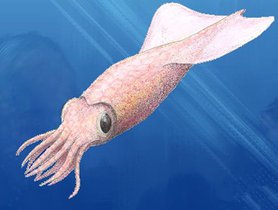(单词翻译:单击)
By this stage, however, Owen's transgressions were beginning to catch up with him. His undoing began when a committee of the Royal Society—a committee of which he happened to be chairman—decided to award him its highest honor, the Royal Medal, for a paper he had written on an extinct mollusc called the belemnite. "However," as Deborah Cadbury notes in her excellent history of the period, Terrible Lizard, "this piece of work was not quite as original as it appeared."
不过,到这个时候,欧文的坏事快干到头了。他的垮台之日到来了。英国皇家学会的一个委员会——欧文恰好是该委员会的主席——决定授予他最高的荣誉:英国皇家勋章,表彰他写的一篇关于一种名叫箭石的、已经绝种的软体动物的论文。“然而,”德博拉·卡德伯里在《可怕的蜥蜴》里对那段历史有绝好的记述,“这项成就并不像看起来那么有创意。”

The belemnite, it turned out, had been discovered four years earlier by an amateur naturalist named Chaning Pearce, and the discovery had been fully reported at a meeting of the Geological Society. Owen had been at that meeting, but failed to mention this when he presented a report of his own to the Royal Society—in which, not incidentally, he rechristened the creature Belemnites owenii in his own honor. Although Owen was allowed to keep the Royal Medal, the episode left a permanent tarnish on his reputation, even among his few remaining supporters.
结果发现,箭石已经于4年前由一位名叫查宁·皮尔斯的业余博物学家发现,而且在地质学会的一次会议上已经充分发表。欧文出席了那次会议,但他向皇家学会提交自己的报告的时候没有提及这个情况。在那份报告里,他把那种动物重新命名为“欧文的软体动物”以纪念他自己,这不是偶然的。尽管欧文被允许保留英国皇家勋章,但这件事使得他永远名声扫地,即使在他剩下的为数不多的支持者中间也同样如此。
Eventually Huxley managed to do to Owen what Owen had done to so many others: he had him voted off the councils of the Zoological and Royal societies. As a final insult Huxley became the new Hunterian Professor at the Royal College of Surgeons.
最后,赫胥黎以其人之道还治其人之身:他通过投票使欧文在动物学会和皇家学会的许多委员会里落选。最后,赫胥黎成为英国皇家外科学院亨特博物馆的新一任教授,结束了对欧文的惩罚。


